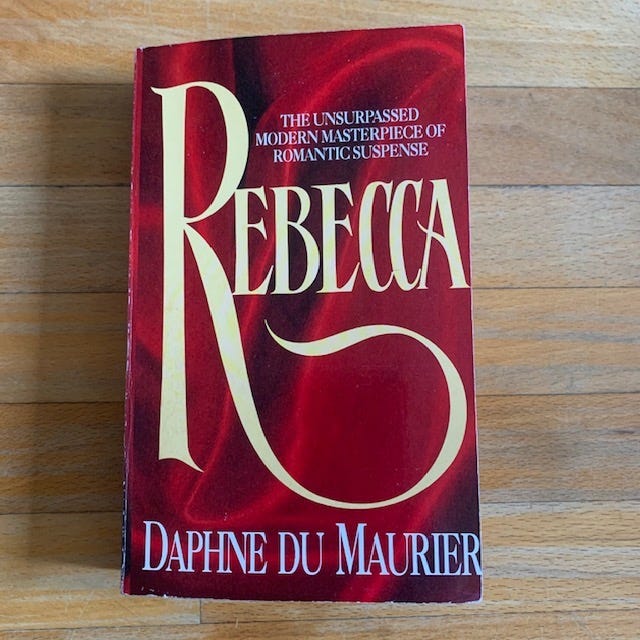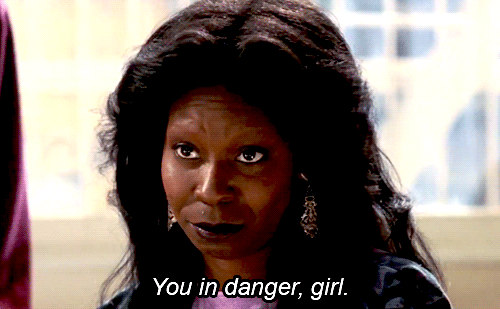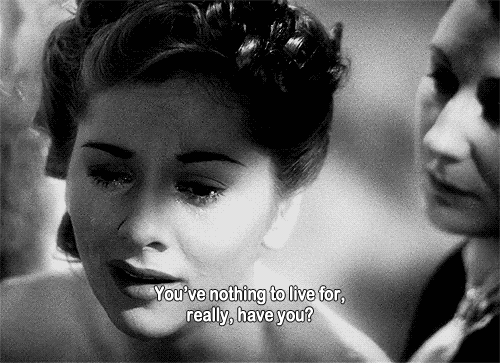
I was asked to review a book about witches this week in honor of Halloween, but I couldn’t find any in my book piles. I think this classic novel will suffice instead because it casts such a spell of suspense, malevolence and psychological terror that I believed it caused me to have an anxiety attack. I’m not kidding. This Sunday’s selection is ‘Rebecca’ by Daphne du Maurier:

Most of you probably read ‘Rebecca’ back in high school, but not me. I picked it up at the Strand in May as a present to myself after I realized du Maurier and I shared a birthday. I guess I avoided it all these years because I assumed it was some silly romance novel full of breathless love and kissy-facing. BUT I WAS SO WRONG! I’m glad I knew nothing about ‘Rebecca’ when I read it because all the crazy plot twists hit me with full force. I literally gasped when … wait, I’m getting ahead of myself. For those of you who haven’t read this book, it’s narrated by an unnamed woman looking back at her short time living at Manderley, a country estate along the English coast. The book begins in Monte Carlo, where the young woman is working as a paid companion for an older aristocratic lady named Mrs. Van Hopper. At their hotel, the protagonist meets Maxim de Winter, a wealthy Englishman who’s on vacation trying, we’re told, to overcome his grief over the death of his wife, Rebecca. Maxim and the woman hit it off, and go for a few drives along the French Riviera. The day she was set to leave with her employer on a trip to New York, she finds Maxim to say goodbye because she may never see him again. He asks her to marry him. With that abrupt courtship, I was like:

After their quickie wedding in Venice, they go to Maxim’s home, Manderley, where the new Mrs. de Winter meets the estate’s staff, led by the sinister head housekeeper, Mrs. Danvers. Here is how Alfred Hitchcock introduces Mrs. Danvers in his film adaptation of the book, which won the 1941 Oscar for best picture:

So creepy! The specter of the deceased Mrs. de Winter, who apparently died in a boating accident, still haunts Manderley as the staff continues to run the estate according to her unalterable orders. The new Mrs. de Winter at every turn stumbles into an unwritten rule of how Rebecca did things, and she is constantly reminded that she is very much inferior to her predecessor. In one scene, she realizes that Maxim pets her like the dog, Jasper, which he would never do to Rebecca. All this causes her to second guess herself, and she lives in constant anxiety of upsetting her husband, the staff and Mrs. Danvers. The latter was devoted to Rebecca and sees the new Mrs. de Winter as a trespasser, and goes out of her way to undermine her. The housekeeper is a master at psychological warfare, and she goes so far as to try to convince the new bride to kill herself by jumping out the window, saying:

But the story gets really intense after a ship runs aground near the beach at Manderley and a diver inspecting the wreckage makes a startling discovery. This leads to a revelation that when I read it I gasped out loud like:

And THEN when we get to the final plot twist that reveals yet another secret about Rebecca’s plot from beyond the grave, my mind was fully destroyed like:

I’m not going to tell you about any of this because I don’t want to spoil it for those of you who have not read ‘Rebecca.’ It’s best to experience these things cold, as my friends who had previously read the book told me. But the story gets very dark once the secrets of Manderley are revealed, and that’s one reason I loved this book. I also loved how it explored the jealousy and insecurities not only of the protagonist, who knocks things over and bites her fingernails in response to feeling unworthy of Maxim’s love and her newfound place in society, but also how Maxim acts to defend what he perceives to be his and his family’s honor. But the reason I can’t stop thinking about ‘Rebecca’ is because I’m trying to figure out why du Maurier chose to leave the main character unnamed. I like to think it’s a combination of reasons. First, it allows the reader to put themselves in the woman’s shoes to ask how would they have reacted. Many of us have felt insecure when starting a new relationship with someone, and are jealous of their exes. Many of us have felt imposter syndrome when starting a new job we feel unqualified for. Some of us have endured the disdain of coworkers when we’ve replaced someone on the job. The dark choices made by the second Mrs. de Winter could have been made by any of us. Second, it’s a way to show that at the beginning of the book the woman’s name doesn’t matter because she’s just an orphan in the service of Mrs. Van Hopper, and therefore doesn’t exist in wealthy society. She’s nobody. And by the end of the book, her name also doesn’t matter because her choice to be complicit in Rebecca’s secrets transforms her fully into her title of Mrs. de Winter, like:

But the second Mrs. de Winter doesn’t realize those choices are dark, and one could argue that the book suggests her decision to keep the secrets of Manderley is perfectly justified. I’m not sure that’s true, though. What I take away from ‘Rebecca’ is that people let their insecurities drive them and allow them to rationalize their behavior. Immediately after I finished the book, I watched the Hitchcock movie on YouTube. This was a mistake. I needed more distance from reading the book to appreciate the movie because I was annoyed by Hitchcock’s changes, most of all how the major plot twists were watered down. But I do recommend that you check out this piece in The Guardian if you’re interested in learning more about du Maurier and ‘Rebecca.’ And, of course, I recommend you read this book.
How it begins:
Last night I dreamt I went to Manderley again. It seemed to me I stood by the iron gate leading to the drive, and for a while I could not enter, for the way was barred to me. There was a padlock and a chain upon the gate. I called in my dream to the lodge-keeper, and had no answer, and peering closer through the rusted spokes of the gate I saw that the lodge was uninhabited.
No smoke came from the chimney, and the little lattice windows gaped forlorn. Then, like all dreamers, I was possessed of a sudden with supernatural powers and passed like a spirit through the barrier before me. The drive wound away in front of me, twisting and turning as it had always done, but as I advanced I was aware that a change had come upon it; it was narrow and unkept, not the drive that we had known. At first I was puzzled and did not understand, and it was only when I bent my head to avoid the low swinging branch of a tree that I realized what had happened. Nature had come into her own again and, little by little, in her stealthy, insidious way had encroached upon the drive with long tenacious fingers. The woods, always a menace even in the past, had triumphed in the end. They crowded, dark and uncontrolled, to the borders of the drive. The beeches with white, naked limbs leant close to one another, their branches intermingled in a strange embrace, making a vault above my head like the archway of a church. And there were other trees as well, trees I did not recognize, squat oaks and tortured elms that straggled cheek by jowl with the beeches, and had thrust themselves out of the quiet earth, along with monster shrubs and plants, none of which I remembered.
The drive was a ribbon now, a thread of its former self, with gravel surface gone, and choked with grass and moss.The trees had thrown out low branches, making an impediment to progress; the gnarled roots looked like skeleton claws. Scattered here and there amongst the jungle growth I would recognize shrubs that had been land-marks in our time, things of culture and grace, hydrangeas whose blue heads had bee famous. No hand had checked their progress, and they had gone native now, rearing to monster height without a bloom, black and ugly as the nameless parasites that grew beside them.
On and on, now east, now west, wound the poor thread that once had been our drive. Sometimes I thought it lost, but it appeared again, beneath a fallen tree perhaps or struggling on the other side of a muddied ditch created by the winter rains. I had not thought the way so long. Surely the miles had multiplied, even as the trees had done, and this path led but to a labyrinth, some choked wilderness, and not to the house at all. I came upon it suddenly; the approach masked by the unnatural growth of a vast shrub that spread in all directions, and I stood, my heart thumping in my breast, the strange prick of tears behind my eyes.
My rating:

‘Rebecca’ by Daphne du Maurier was published by Doubleday & Company, Inc. in 1938. It was first published by Avon Books in 1971. 380 pages. $7.19 at Strand Book Store.
More things worth your time:
Read this: We don’t often talk about sports here, but I can’t stop thinking about this article on ESPN about Carmelo Anthony. Last year, Anthony was one of the top scorers in the NBA, but now he’s out of the league. ‘The burnout of the shooting star Carmelo Anthony’ deals with the end of one’s professional life (which too often comes before we are ready), how an industry can change around us and leave us behind, and what it means existentially when we are no longer allowed to participate in our chosen career. Zack Lowe’s podcast with Baxter Holmes, who wrote the piece, is good, too.
Read this, too: President Supervillain is one of my favorite follows on Twitter. It features mashups of quotes from our current president with comics featuring the Red Skull, the mortal enemy of Captain America. The Guardian recently interviewed the anonymous person behind the hilarious account.
Do this: Author Steph Cha discusses her new novel ‘Your House Will Pay’ with Sarah Weinman at Books Are Magic (scroll down its events page for details) on Thursday, Nov. 7 at 7:30 p.m. Cha’s book explores the legacy of racial tensions in 1990s Los Angeles through the eyes of Korean-American and African-American families. The event is free. RSVP here.

Next week begins ‘Novella November,’ when Books on GIF will switch to weekly publication for a month full of short stories. Each newsletter will contain at least two slim reviews. We’ll kick it off with ‘The Dry Heart’ by Natalia Ginzburg and ‘A Northern Line Minute’ by William Leith. Also in the queue are ‘McGlue’ by Ottessa Moshfegh, ‘Mary Ventura and the Ninth Kingdom’ by Sylvia Plath and ‘Down the Rabbit Hole’ by Juan Pablo Villalobos, among others.
In case you missed it: Books on GIF #115 featured ‘In the Distance’ by Hernán Díaz.
Shoot me an email if there’s a bestseller, a classic or a forgotten gem you want reviewed.
Follow me on Twitter and Instagram.
Thanks for reading, and thanks especially to Donna for editing this review!
Until next time,

MPV



